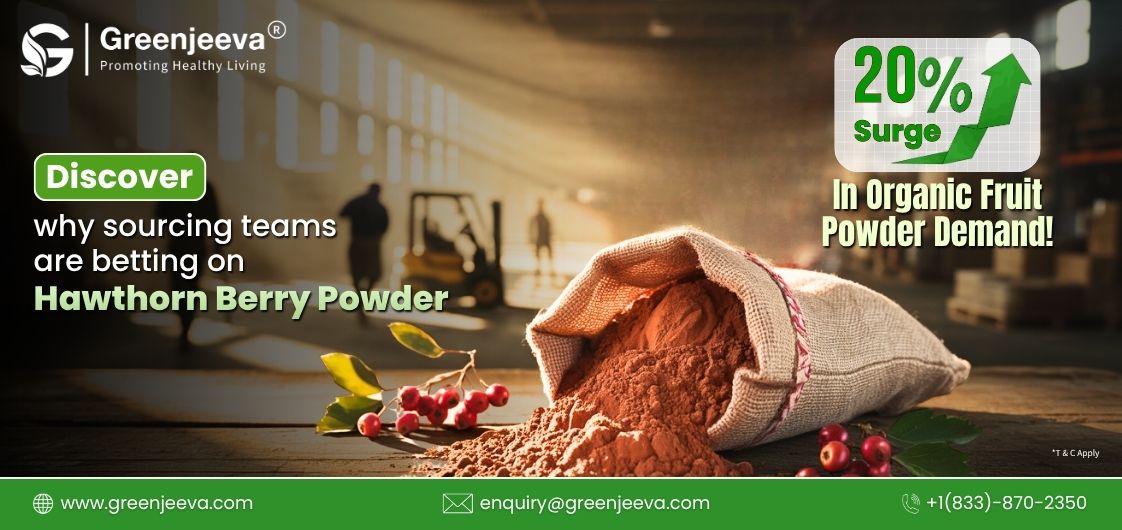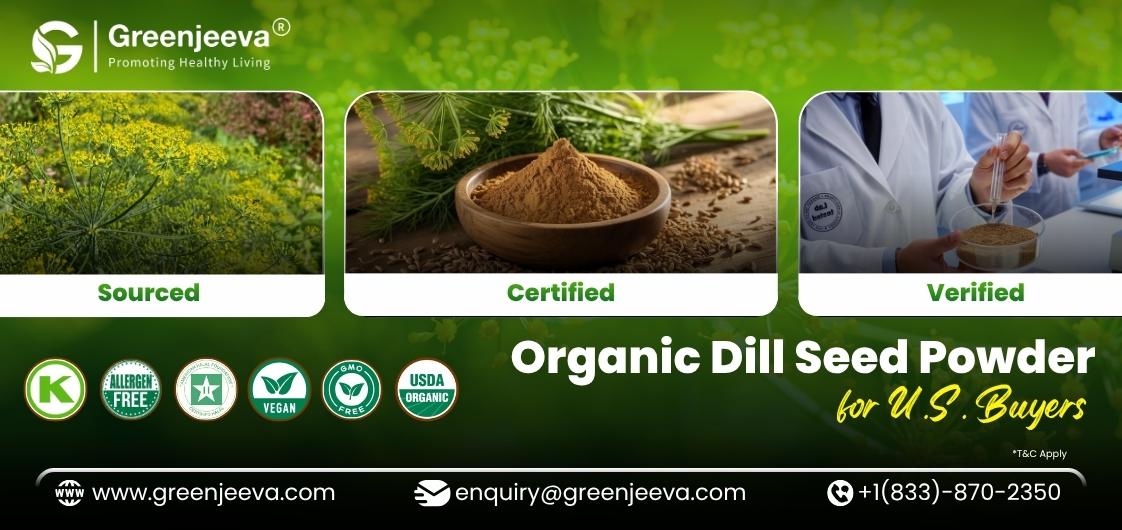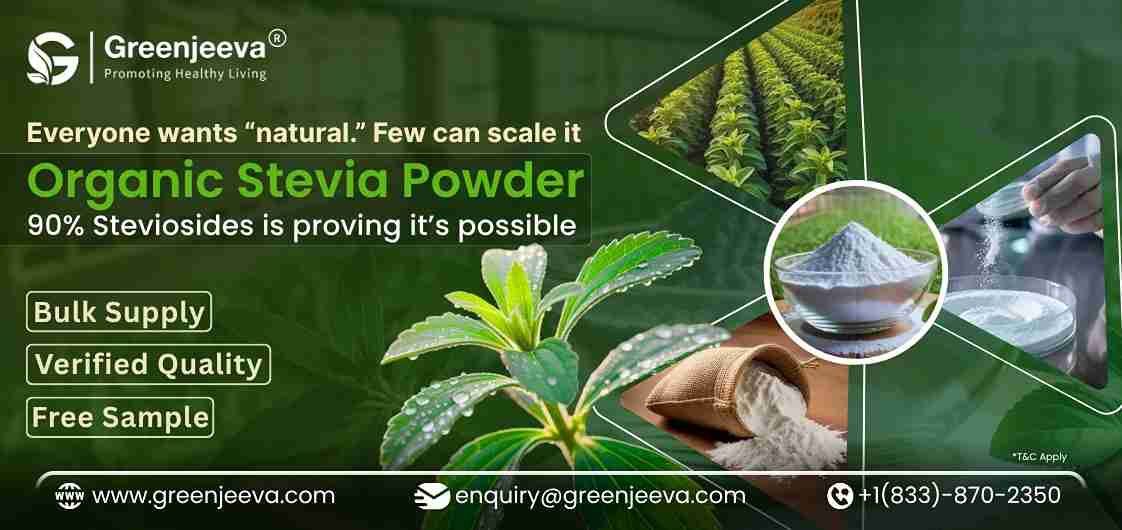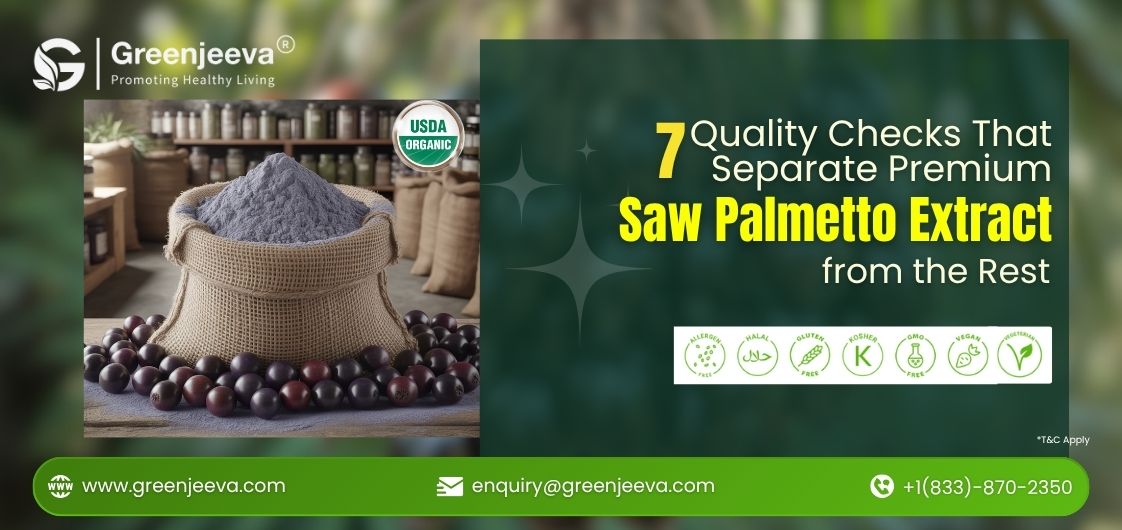Your Checklist to Choose the Right Organic Amla Powder Supplier
.jpg)
If you're in the market for bulk organic amla fruit powder, you're not just sourcing an ingredient you’re safeguarding the integrity of your product. Whether you're formulating nutraceuticals, herbal teas, clean-label supplements, or superfood drink blends, the stakes are high.
A leading market research firm has published a report with very interesting information, “In North America and Western Europe, amla dry extract is used as a premium functional ingredient in nutraceuticals and natural personal care. Demand is driven by its clinically proven antioxidant benefits, especially for anti-aging, heart health support , and blood sugar support. Buyers prefer standardized extracts with defined bioactives like Emblicanin A & B and gallic acid. Regulatory support (e.g., FDA GRAS status) boosts its use in foods and beverages like smoothies and bars.
"The market is growing at ~20% CAGR, supported by clean-label trends and scientific backing. Pricing is higher than in South Asia due to quality, certifications, and processing standards. However, some smaller Indian suppliers struggle to meet strict Western quality requirements, affecting sourcing.”
With demand for organic Indian gooseberry powder surging in the U.S., poor sourcing decisions can lead to synthetic fillers, underperforming potency, or worse compliance issues.
This guide walks you through 7 strategic questions that smart buyers' formulators, sourcing heads, and product developers ask before locking in a supplier. Whether you’re buying for adaptogenic blends, functional foods, or private label supplements, use this as your checklist to find a partner who’s as committed to quality as you are.
1.What Should You Know About the Origin of Organic Amla Powder?
Choose a bulk supplier with traceable USDA-certified farms, preferably from India or the USA. Farm origin impacts nutritional quality and supply chain transparency.
- Ask if the amla is wild-harvested or cultivated.
- Prefer traceable sources of USDA certified amla fruit powder.
- Some premium suppliers now offer US-grown amla powder for domestic brands.
- Geographic origin affects antioxidant levels and taste.
Beyond basic traceability, consider climate and soil quality factors that impact the concentration of tannins, flavonoids, and natural vitamin C. For instance, Indian-grown amla from certain regions like Madhya Pradesh or Rajasthan may have higher antioxidant potency, while U.S.-grown batches may offer better regulatory assurance and reduced lead times. Check whether your supplier can offer origin-specific spec sheets or historical COAs that validate consistency across harvest cycles. Also, explore whether the supplier maintains direct farm partnerships or works through intermediaries this can influence quality control.
2. How Is Amla Processed And Does It Preserve Nutritional Integrity?
Look for freeze-dried or low-heat dried amla powder to preserve Vitamin C and polyphenols. Avoid high-heat drying and unnecessary additives.
- Choose freeze-dried amla powder for functional foods to retain more bioactives
- Confirm it's non-GMO amla powder bulk and free from irradiation.
- For tablets, ensure you’re getting fine mesh amla powder for smooth processing.
- Avoid synthetic ascorbic acid a red flag for adulteration.
Processing method can significantly influence the end-use functionality of amla powder. Freeze-drying, though more expensive, preserves the delicate balance of tannins, polyphenols, and ascorbic acid making it ideal for high-performance applications like functional beverages or premium capsules. On the other hand, high-heat dehydration may degrade vital actives and leave the powder less potent.
Buyers should also evaluate mesh size consistency (especially for encapsulation or tablet pressing), solubility in liquid applications, and pH stability in blends. Request a processing flowchart, equipment list, or even video footage if possible transparent suppliers often welcome these requests.
And don’t overlook sensory characteristics. Amla powder that smells burnt or stale likely went through suboptimal heat processing. Meanwhile, excessively uniform or bright color might suggest synthetic color enhancers. Amla’s natural taste should be tart, slightly bitter, and distinctly herbal.
3.What Certifications and Lab Tests Should a Trusted Supplier Share?
The right supplier should provide USDA Organic, Non-GMO, and third-party lab tests covering Vitamin C content, heavy metals, and microbial safety.
- Ask for updated USDA Organic certifications.
- Third-party test reports should cover Vitamin C %, heavy metals, microbes, and pesticides.
- Ensure COA, MSDS, allergen info, and spec sheets are available.
- Trustworthy amla fruit powder manufacturers USA are transparent and compliant.
Equally crucial are lab test results. Ask for third-party test reports that confirm the Vitamin C content (natural ascorbic acid), microbiological safety, and heavy metal content within U.S. and EU permissible limits. Look for reports from accredited labs where possible.
Another essential is pesticide certifications aren’t just marketing badges they’re operational guarantees. Ensure your supplier provides valid and recent documentation from USDA, Non-GMO Project, and applicable Halal, Kosher, and Vegan certifiers depending on your market requirements. These demonstrate a commitment to clean-label compliance.
Even organically farmed botanicals can sometimes carry residues from adjacent fields or non-compliant water sources. Ensure you get a full-spectrum pesticide analysis.
Finally, robust documentation includes COA, MSDS, nutritional panel, country of origin, and export certifications (FDA compliant). Make sure these are available for every batch not just upon request.
4.Is the Supplier Ready to Scale and Support Product Development?
A capable supplier supports private label manufacturing, contract packaging, and seamless logistics for bulk orders across categories.
- Do they support bulk amla powder for private label supplements?
- Can they handle contract manufacturing with organic amla fruit powder?
- US inventory = fewer customs headaches and faster turnaround.
- Ask if they cater to clean-label vitamin C rich powder for beverages, herbal teas, and adaptogenic blends.
If you're developing a national or global product line, you need a supplier who can scale with your growth. Ask whether they can offer MOQ flexibility, multi-ton monthly capacity, or seasonal availability forecasts this helps ensure consistent formulation year-round.
Explore if the supplier supports private label or white label solutions. This can streamline your go-to-market timeline. For supplement developers, confirm if they provide encapsulation-grade powder, custom mesh sizes, or heat-sealed pouches for retail-ready use.
Logistics are another game-changer. Suppliers with FDA-registered warehouses in the U.S. offer shorter lead times, fewer customs delays, and smoother reorders. Bonus points if they integrate with third-party logistics (3PL) providers or offer Vendor Managed Inventory (VMI) suppor
Finally, inquire if they offer formulation support especially if you're building multi-ingredient blends. Experienced suppliers often have in-house specialists who help optimize compatibility, solubility, and labeling requirements for functional food and beverage categories
5.How Can You Detect Adulteration or Synthetic Additives?
Taste, lab reports, and ingredient lists can help detect fillers like maltodextrin or synthetic ascorbic acid in bulk amla powder.
- Real dried Indian gooseberry powder for capsules has a tart, earthy aroma
- Powder that's too chalky or sweet might be diluted.
- Ask for HPTLC/HPLC test reports to confirm antioxidant profile.
- Verify label: Your organic amla powder for supplements should contain only amla.
Adulteration remains a serious concern in the global botanical market. Amla powder, due to its tart profile, is often diluted with maltodextrin or masked with synthetic ascorbic acid to mimic high vitamin C content. Ask to see HPTLC, HPLC, or UV-spectrophotometric profiles that compare antioxidant curves across batches.
Also, examine the ingredient label and the COA. High-quality non-GMO amla powder bulk should list only one ingredient: organic amla (Emblica officinalis). If you see anti-caking agents, carriers, or colorants, ask why they were added.
Smell and taste are powerful initial indicators. Fresh amla powder should smell tangy, herbal, and slightly sour not sweet or neutral. Color can range from yellowish-green to light brown depending on drying method, but overly bright hues may indicate enhancement.
Finally, avoid powders with “vitamin C added” unless the source is disclosed. True natural antioxidant-rich fruit powder for product developers does not require synthetic boosters. Clean-label buyers should demand transparency, and the best suppliers will always be ready with answers.
When choosing a supplier for organic amla fruit powder wholesale USA, you're not just picking a vendor you’re selecting a quality assurance partner. The best ones deliver documentation, reliability, and clean-label compliance.
Looking to scale? Choose a US-based amla fruit powder manufacturer that understands the needs of product developers, formulators, and sourcing teams.
Explore Green Jeeva’s portfolio of USDA-certified, non-GMO amla powder for superfood blends, supplements, teas, and more.
FAQ’s: Sourcing Organic Amla Fruit Powder in Bulk from Green Jeeva
Q1. What certifications are available for your Organic Amla Fruit Powder?
USDA Organic, Non-GMO, Kosher, Halal, and vegan-compliant options are available.
Q2. Can I request a sample for R&D before placing a commercial order?
Yes. Samples are provided with full documentation.
Q3. Is this powder suitable for dietary supplements and herbal capsules?
Yes, especially our fine mesh amla powder for dietary supplements.
Q4. Do you provide full documentation for regulatory compliance?
Each batch ships with COA, MSDS, allergen statements, heavy metals, and pesticide reports.
Q5. Where is your inventory stored, and how quickly can you fulfill orders?
We store in FDA-registered warehouses across the U.S and Canada with fast regional fulfillment.
Q6. Do you offer Vendor Managed Inventory (VMI)?
Yes. We support VMI procurement plans.
Q7. Why choose Green Jeeva?
Beyond ingredients, we offer documentation support, fast logistics, and responsive sourcing solutions.
References.
Raw amla vs amla powder vs dried amla: Which is healthier? | - The Times of India
Amla Dry Extract Market - PW Consulting Chemical & Energy Research Center
**The Food and Drug Administration has not evaluated these statements. This product is not intended to diagnose, treat, cure, or prevent any disease.**






